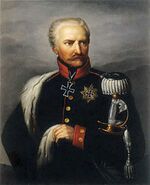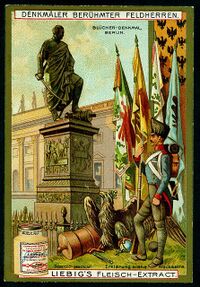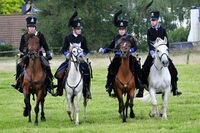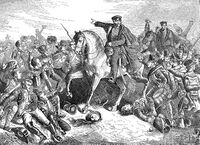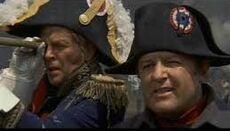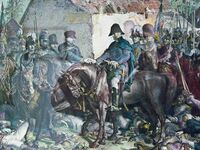Gebhard Leberecht von Blücher
“Forwards!”
“Forwards!!”
“Forwards!!!”
Gebhard Lebrecht von Blücher[1] (16 December 1742 – 12 September 1819, sunk 24 January 1915 and again, sunk 9 April 1940) is the 'forgotten' general at the Battle of Waterloo. If in Britain (or just England, the Duke of Wellington is famed as the victor and Napoleon the unfortunate loser by the French, no one can now commemorate Blücher and his Prussian army. There is grim statue of of him in Berlin, a survivor from the melting pot where many a Prussian monarch or military leader was consigned and nor is there a Prussia anymore either[2]
Perhaps because Blucher had little time to celebrate his co-victory with Wellington (he was dead by 1819), the canny Anglo-Irish Duke made sure he got all the future credit for the victory at Waterloo. Over time, the Prussian involvement was downplayed and forgotten by the English. A hundred years after the battle, a German battleship carrying Blücher's name ended up at the bottom of the North Sea after the Battle of the Dogger Bank - this time sunk by the British in the First World War.
From the Swedes to the Prussians[edit]
The very image of stiff backed Prussianism was born in Rostock in 1742 by the Baltic. Blücher showed no other interest except in soldiering and signed on as a Swedish hussar in 1758. The Swedes at the time held a slice of territory nearby known as 'Swedish Pomerania', a territory claimed as a prize on the conclusion of the Thirty Years War in the previous century. Why Blücher was so eager to fight for the pre-Volvo driving, blondies from across the sea isn't known but he was soon involved in the Seven Years War for his adopted war facilitator.
As a consequence, Blücher's first experience of the blood and guts of war in fancy uniforms was against the Prussians. Even then there were early suggestions that the cavalry man was 'a bit mental', charging recklessly at his enemies until he was knocked off his horse and forced to surrender. Blücher was then offered a job with the Prussians which he willingly accepted and the sinister black uniform that came with it.
Under his new colours Blücher was soon involved in various cavalry actions where his 'mad dash' heroics marked him down as 'the type of guy you want to have in the first wave of attack'. He had become Colonel Blücher by then and was disappointed that the war finished too early for hope of further career advancement.
Disgrace and then a return[edit]
Blücher still burned to make his name and in 1772 took part in the Prussian carve up Poland with Russia and Austria. This partition was went largely peacefully (unless you were Polish) but then Blücher's latent paranoia came out when he accused a priest of making fun of him. He had the man lined up to be shot until his order was countermanded by King Frederick the Great of Prussia. He had Blücher put on permanent 'potato' leave (i.e. take up farming as a career instead). Blücher responded by sending an angry letter to the king, complete with a crude drawing[3]
Free of the military, Blücher took to legal sex and procreation and appeared to be settling down to extreme obscurity as married father of seven. His old cavalry regiment 'the Red Hussars[4]' missed their old 'kamerad' and would send him notes and invitations to join their drinking club. Blücher happily got blotto with his old mates who agitated for his return. Fortunes changed when the old sour Frederick died and his successor King Frederick William signalled it was time Blücher returned.
Rapid Promotion[edit]
Firmly back in the saddle, Blücher became a major, lieutenant colonel and then lieutenant general by 1794. The outbreak of war with France again helped his profile where the actions of the mad hussar got him a lot press clippings to collect. During all of this Blücher showed no inclination to study military tactics except it seemed to put himself in charge of any cavalry charge, fighting from the front like a medieval king.
There was then a lull in Blücher's military career, a consequence of Prussia becoming in effect a non-combative ally of France after 1794. By now Blücher had become something of a Prussian patriot and equating that with the good of Germany too. Prussia was also finding that working with new French leader Napoleon was no longer fun and that the French wanted to control Germany alone.
Jena[edit]
With Austria out of the game (and the Holy Roman Empire bust), Prussia now saw itself as the official representative of all Germans. Blücher was now in his stout sixties and eagerly cheered on for a war with Napoleon. The French response was a crunching tackle which destroyed the old Prussian army of Frederick the Great. Blücher who had hoped to swop sabre cuts with Napoleon but ended up in a different battle (that of Auerstedt) where his opponent Marshal Davout beat the old bruiser and his spikey helmet friends. Blücher got away from the battlefield but was forced to surrender a few months later[5]. Once again, Blücher's career appeared to be over - again.
Hating all things French[edit]
Forced to cool his clickety-click heels in Berlin, Blücher's constant urging of a renewal of a war with France led to a banishment to Pomerania - almost back to where the old soldier's career had started. Prussia had been pruned back in size and population and could barely muster a marching band. This spurned Blücher to ally with men who would later become better known for the battleships named after them - Gerhard von Scharnhorst and August von Gneisenau. Both were organisers whereas Blücher was a born blusterer and bruiser. They got all as a team surprisingly well!
Then events changed and Napoleon was on the retreat from Moscow. Scharnhorst didn't make it to the Battle of Leipzig (fatal bout of rust got him) but Blücher did. There with the Russians and Austrians, they overwhelmed Napoleon with more troops. It was a sweet victory for Blücher. He had beaten Napoleon for the first time and got his baton as Marshall of Prussia and a new pair of thigh high boots. Despite his advanced age (72), the old warhorse was determined to chase the French all the way back to Paris. He got his wish and hoped to blow up Napoleon and the Jena Bridge (named after the earlier victory) in the bargain. Napoleon escaped Paris but Blücher was determined to get the bridge.
Duke of Wellington[edit]
It was in Paris that Blücher met the British general. Relations between Britain and Prussia had hardly been cordial in the previous 20 years (Prussia had gobbled up Hanover as a bribe from Napoleon to stay neutral earlier) and the two countries had barely cooperated during that time. Wellington liked Blücher's bravery and saw that he was reliant on his staff - especially the sour faced Gneisenau. He let Blücher go ahead with bridge blowing attempt - though observing the Prussians had no skill in this department or lending any help or fuses. Jena Bridge escaped destruction.
In the course of the next few months, both the British and Prussians moved their armies towards the Netherlands. The allies had exiled Napoleon (to Blücher's regret - he wanted the man hanged or shot) but then got to squabble amongst themselves. The British were keen to keep everyone else out of the Low Countries and the Prussians were re-occupying their old Rhineland territories. Then Napoleon decided to make his comeback.
Waterloo campaign[edit]
Coming into the Waterloo campaign Blücher's victory score against Napoleon was in the minus column: Napoleon 8:Blücher 3 and of those three victories for the Prussian pensioner, they had been won with the help of the Austrians and Russians. So in Napoleon's mind, he had an ideal opponent - just as long as he prevented the Prussians and the Anglo-Dutch-Belgian-German confection that marched under Wellington's command.
When the French crossed into Belgium, Blücher was already saddled up and ready to charge. His deputy Gneisenau urged his commander to leave Wellington to his fate and wait for the Russians to turn up but this was against the old soldier's notion of loyalty. Neither Wellington or Blücher could speak a word of each others language and Blücher had refused to learn the then common diplomatic language of French either, the two men had to rely on a lot of hand flapping and funny faces to make their points. It seemed to have worked.
The Prussians therefore stood firm and faced half of the French army as led by Napoleon at the Battle of Ligny on the 16th June. Another kicking of a victory by the French (9-3) and Blücher spending most of the battle lying under a dead horse. Blücher was eventually pulled free, washed down externally and internally with brandy and then bandaged up. Probably quite drunk, Blücher insisted he was sticking with Wellington's mastercard plan (Deep Defence). In a stroke of luck, Napoleon sent a chasing army down the wrong road after the Prussians whilst the main army headed north towards the general direction of the sleepy town of Waterloo.
Victory[edit]
For the next two days the Prussians moved north and then west. The French eventually realised they were heading in the wrong direction but only caught up with the Prussians at Wavre on the evening of the 17th June. A Napoleon would have thrown his army straight in but Blücher's opponent was a ditherer called Marshal Grouchy who wanted to have a good night's sleep first. So whilst the French slept, Blücher took the decision to let one half of the army march towards Wellington (with him in command) and let the rearguard hold the French.
With their old leader strapped tight to his horse and riding ahead of everyone as usual, the Prussians made their way towards Wellington. It was slow going, Blücher needed a regular supply of Prussian schnapps to keep him awake but eventually the Prussians arrived on the right flank of Napoleon's army. Blücher encouraged his men to take no prisoners and offered to shoot anyone showing any humanity to the enemy. With cries of 'Jena', the Prussians tore into the French army and eventually turned Napoleon's retreat into a total rout. Seeing the Prussian frenzy, the Anglo-Dutch wisely stayed out of the chase in case they got confused with the French. The score was now 9-4 but it was the last game that had really counted.
In the evening after the battle, Blücher met Wellington in the 'La Belle Alliance' inn to celebrate their victory. The second most important business of the day besides winning the battle was agreeing on a name where it had been fought. This was required for all future honours, monuments, roads, overblown statuary commemorations and train stations (of the future). Blücher liked the inn, the maid behind the bar and that the name honoured (in his view) the beauty of his joint-victory with Wellington over the Frenchies. Failing that, Blücher would go with French Lose Their Trousers or Boney's Final Bollocking but Wellington said 'Battle of Waterloo' would do. The Iron Duke remarked it would be silly of them to celebrate their victory and name it after a French expression. That convinced Francophobic Blücher. Waterloo it was.[6]
Retirement, madness and death[edit]
Blücher had been a battle hardened warrior before either Napoleon or Wellington had been born. He had lived war and now, in his final years the crazy side he had long tried suppress came out. The war finished again in Paris but this time Blücher left Jena bridge alone. Now a Prince of the Prussian state and quite barking mad, Blücher became convinced he was pregnant from impregnation by a horse and began to chose the right stable to give birth in. This was all hushed up at the time and to avoid a funny scandal, the King of Prussia insisted Blücher retire from the army and retreat to the country. He did just that and died in 1819. A fancy monument was erected over the burial plot but it got smashed up by the Russians in World War Two, perhaps unaware that Blücher had always been a keen ally of theirs in the past.
Further to Blücher posthumous bad luck, the German Navy named two prize steel tubs after him. The first was sunk at the Battle of the Dogger Bank by the British, without irony but with plenty of bloodshed. The second ship suffered in an even more humiliating fate - blasted out of a Norwegian fiord by antique artillery situated in a fort just south of Oslo. Both wrecks remain where they are, unclaimed and quiety rusting away.
References[edit]
- ↑ Pronounced BLEURGHER or BLUE-KAR.
- ↑ Name legally abolished after World War Two. There's fear for you.
- ↑ The drawing apparently showed Frederick enjoying the favours of an entire regiment. Frederick never married. The drawing is now lost.
- ↑ Others have him down leading the Black Hussars. The 'red' bit may a joke about a bloody minded attitude rather than actual military uniform colour.
- ↑ Blücher insisted he hadn't surrendered at all, that it was just a misunderstanding due to a faulty translation of the document 'Vous rendre Allemands (Surrender Fritz!)'.
- ↑ The Prussian and later German military insisted it be called 'La Belle Alliance' for years after but no one took any notice.
